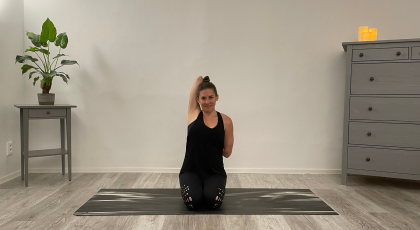View basket (0 items $0.00)

Study Finds that Yoga, Meditation Can Reduce Health-Care Utilization
Health care costs drive millions of Americans into bankruptcy and poverty each year. Over the past decade increasing evidence points to mind-body interventions like yoga as being highly effective in reducing stress and improving well-being. A landmark study of one such program published in the research journal PLOS One provides convincing evidence that mind-body training is linked to significant long-term increases in health and reductions in medical treatment utilization.
Study Examines Relaxation Response Resiliency Program and Stress
Chronic stress undermines our physical and psychological health and is one of the leading causes of medical visits. While most traditional medical interventions target disease symptoms, very few address one of the number one causes of illness: chronic stress. The Relaxation Response Resiliency Program (3RP) is designed to do just that—teach patients how to decrease stress and increase resiliency. In theory, programs such as these should lead to decreased stress, fewer health complaints and considerable reductions in health care service utilization.
Researchers at Massachusetts General Hospital Benson-Henry Institute tested this hypothesis by examining the medical records of patients who had either received 3RP training (n =4,452) or no-treatment controls (n = 13,149) between January 2006 and July 2014.
Records one year before and after 3RP training were examined for the intervention group and compared to those of a control group of patients who were matched to the 3RP group by age, ethnicity and gender. Key outcomes of interest included the number of billable medical encounters per year (doctor visit, imaging, laboratory, medical procedure, ER visit etc.).
Participants in the 3RP group included any patient who was referred to either individual or group training in 3RP at the MGH Henry-Benson Institute during the study period. The overarching goal of 3RP is to reduce the stress response, elicit relaxation and increase resiliency. The eight-session intervention integrates relaxation, meditation, mindfulness and cognitive skills training with social support and positive psychology.
When comparing the 3RP and control samples it was discovered that those in the 3RP group were more likely to identify as Asian versus African-American, to identify as Jewish or having no religious affiliation, and to have a higher median income than control participants. Both groups spent approximately the same continuous length of time (more than four years) within the healthcare system.
Healthcare utilization differences between the two groups were significant, with those in the 3RP group averaging a 43% reduction in billable medical and/or diagnostic visits. On the other hand, control group members demonstrated increases in the number of outpatient and specialty care visits and hospital admissions. The authors of the study estimate that reductions in service utilization in the 3RP group translate to a median cost savings ranging from $640 - $25,500 per patient per year. This represents a considerable reduction in medical costs, particularly for those suffering from chronic illness.
The Future of Healthcare and Mind-body Therapies
Unfortunately, with few exceptions, the American health insurance industry lags behind much of the modern world in their willingness to pay for complementary forms of care. This in spite of the fact that a 2012 National Health Statistics Report that showed that well over 10 percent of Americans regularly engage in mind-body practices like yoga, meditation, tai chi and qigong within the past year to decrease stress and increase health and well-being.
Data from this medical utilization study offer resounding evidence that health insurance companies, systems and providers would better serve patients’ health and financial well-being by including mind-body therapies as standard forms of care. As the authors of this study state, “The focus in healthcare is shifting from high utilization of specialized care for the treatment of late-stage disease to an emphasis on patient-centered approaches and coordinated care teams that promote wellness, support self-care, provide preventive care and effective disease management … Our results indicate that mind-body interventions, such as 3RP, can reduce individual disease burden as well as the utilization of healthcare resources and are well suited to the changing healthcare environment.”
This sounds like a win-win scenario for both patients and the systems that serve them!
Learn more about curbing stress and improving health, in another article from B Grace Bullock: Yoga and Meditation Can Change Your Brain, New Yoga Research Suggests.
 B Grace Bullock, PhD, E-RYT 500 is a psychologist, research scientist, educator, author, yoga and mindfulness expert and creator of BREATHE: 7 Skills for Mindful Relationships. Her mission is to reduce stress, increase health and wellbeing and improve the quality of relationships. She offers classes, workshops, writing and research that combine the wisdom of applied neuroscience, psychophysiology, psychology and contemplative science and practice. Her goal is to empower individuals, groups, leaders and organizations to reduce chronic stress and increase awareness, attention, compassion, mindfulness and effective communication to strengthen relationships, release dysfunctional patterns and unlock new and healthy ways of being. Dr. Bullock is a Certified Viniyoga Therapist and Faculty at the Integrated Health Yoga Therapy (IHYT) Training program. She is the former Senior Research Scientist at the Mind & Life Institute and former Editor-in-Chief of the International Journal of Yoga Therapy. For more information see www.bgracebullock.com
B Grace Bullock, PhD, E-RYT 500 is a psychologist, research scientist, educator, author, yoga and mindfulness expert and creator of BREATHE: 7 Skills for Mindful Relationships. Her mission is to reduce stress, increase health and wellbeing and improve the quality of relationships. She offers classes, workshops, writing and research that combine the wisdom of applied neuroscience, psychophysiology, psychology and contemplative science and practice. Her goal is to empower individuals, groups, leaders and organizations to reduce chronic stress and increase awareness, attention, compassion, mindfulness and effective communication to strengthen relationships, release dysfunctional patterns and unlock new and healthy ways of being. Dr. Bullock is a Certified Viniyoga Therapist and Faculty at the Integrated Health Yoga Therapy (IHYT) Training program. She is the former Senior Research Scientist at the Mind & Life Institute and former Editor-in-Chief of the International Journal of Yoga Therapy. For more information see www.bgracebullock.com
Sources
Stahl JE, Dossett ML, LaJoie AS, Denninger JW, Mehta DH, Goldman R, et al. (2015) Relaxation Response and Resiliency Training and Its Effect on Healthcare Resource Utilization. PLoS ONE 10(10): e0140212. doi:10.1371/journal.pone.0140212
Featured Courses








